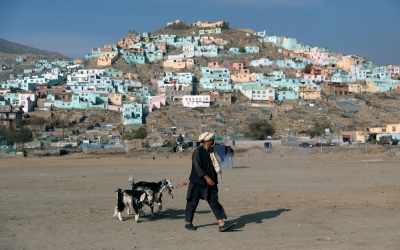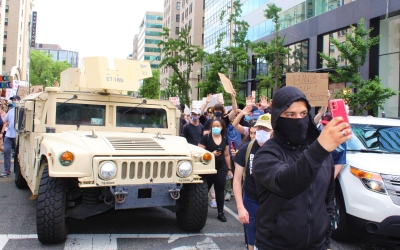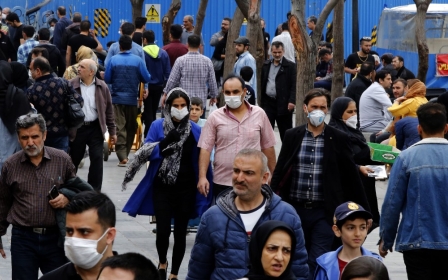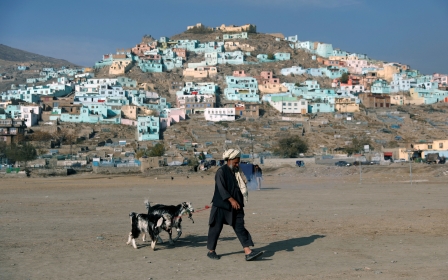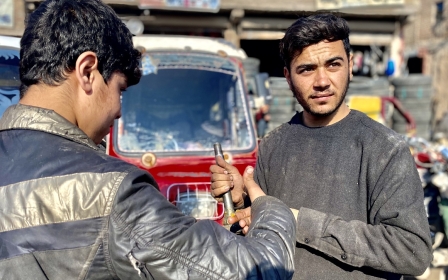'I am burning': Afghans condemn Iranian police after refugees die in car blaze
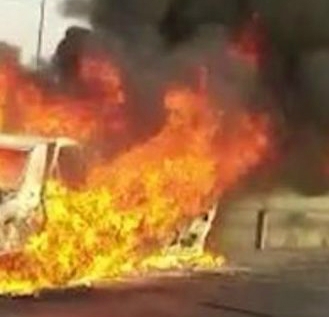
Police in Iran have been accused of a deadly shooting on a car that led to a fire and the deaths of at least three Afghan refugees.
At first, local media in Afghanistan and Iran referred to the incident on Friday, which was captured on video, as a “traffic accident”.
One of the videos pans from a vehicle on fire, with a dead body in the trunk, to one of the survivors, a youth in tattered and burnt clothing, crying and saying,“Bring me some water. I am burning.”
The police, who reportedly shot at the vehicle after it failed to stop at a checkpoint in the central province of Yazd, are nowhere to be seen in any of the footage.
Officials in Yazd said the vehicle caught fire due to its high speed and a collision with the roadside divider.
Although initial media headlines were rather tame, by the time the footage started to circulate online on Friday afternoon, Afghans in the country and abroad were quick to make comparisons between the incident and the police shootings of unarmed Black men that have led to mass protests across the United States.
The youth’s pleading words have been turned into a hashtag which Afghans have used to call out the treatment of their people in Iran.
The Afghan government has called for an investigation into the shooting, which they say resulted in three deaths, four injuries and a number of disappearances, all of whom were Afghan citizens.
Afghanistan's foreign ministry said the video was genuine and that Afghans in Iran were trying to identify the victims.
'Human lives matter'
Last month, Iranian border police were accused of detaining, beating and torturing dozens of Afghans before forcing them at gunpoint to jump into the Harirod River, which runs through Afghanistan, Iran and Turkmenistan, where they drowned.
At the time, Iranian foreign ministry spokesman Abbas Mousavi issued a statement saying only that the incident in question had taken place on Afghan soil.
The Afghan government promised a “thorough investigation” of the drownings, but the findings have yet to be made public.
In response to the deaths in Yazd, Shahrzad Akbar, Chairperson of the Afghanistan Independent Human Rights Commission, called for the release of the findings of the investigation into the May drownings.
In reference to the Yazd incident, Akbar tweeted: "Perpetuators (sic) need to be held accountable. Human lives matter. Reufgee (sic) rights are human rights."
Double standards
For many Afghans, the deaths in Yazd are especially galling considering Tehran’s support of the ongoing #BlackLivesMatter protests sweeping the US.
Javad Zarif, Iran’s foreign minister, has spent the last several days antagonising the Trump administration online using the hashtags #WorldAgainstRacism and #BlackLivesMatter.
Even before the deaths in Yazd, Afghans called out Zarif for his apparent hypocrisy given Iran’s mistreatment and abuse of Afghans, an issue which has been documented repeatedly by rights groups.
Zahra Nader, a former New York Times journalist based in Kabul, responded to Zarif’s online call for a world against racism, by recounting her own experience growing up in Iran.
“What would be the role of Iran in #WorldAgainstRacism? As a refugee child in Iran, I was deprived of human rights, particularly education. I was called “nasty Afghan” on the streets and suffered abuse on daily bases (sic). Iran is racist and it continues to oppress Afghan immigrants,” Nader tweeted.
Peymana Asad, an Afghan-British councillor for the UK's Labour Party, tweeted in response to Zarif: A “bit rich of you to lecture anybody else about racism when minorities are being killed in #Iran. People are tweeting using this hashtag #کمی_آب_بیار_که_سوختم it translates to 'Give me some water I’m burning' because those are words of one Afghan BURNT ALIVE.”
'Political footballs'
In 2013, Heather Barr, the acting co-director of the women’s rights division at Human Rights Watch (HRW), conducted an investigation into the claims of abuse of Afghan refugees in neighbouring Iran.
Barr said the US-based group documented daily instances of abuse against Afghans which they presented to the Kabul government, but that the perceived power imbalance was palpable in those discussions.
“The Afghan government was sympathetic to our findings and very ready to engage. But our discussions with them had a pervasive sense of powerlessness,” Barr said.
“Afghan refugees and migrants in Iran were political footballs. In spite of some ambitious plans on paper, the Afghan government had virtually no ability to help Afghans returning - or being deported - from Iran to get back on their feet.”
Threats of deportation and the political manipulation of Afghan refugees have also loomed large over Iran’s recruitment of thousands of Afghan men to fight for the forces of President Bashar al-Assad's government in Syria.
Iranian threat
Not even the coronavirus has put an end to the deportations of Afghan refugees from Iran.
Each week since the pandemic began, tens of thousands of Afghans have either been forcibly returned, or chose to return to Afghanistan due to a lack of assistance and medical treatment as the virus spread.
Regardless of the political reasons, Afghans online have also taken a harsh view of their own government, which they say has not done enough to hold Tehran accountable for its treatment of Afghans.
Barr said Tehran’s constant implicit threats of deporting millions of Afghans back to a country already devastated by a deadly war and a flailing economy, may be what is keeping Kabul from taking more concerted action against their western neighbour.
“The threat from Iran to engage in even bigger mass deportations of Afghans hung over the Afghan government all the time, and muzzled them from being able to speak out about the daily abuses we documented through our research,” Barr said.
Middle East Eye propose une couverture et une analyse indépendantes et incomparables du Moyen-Orient, de l’Afrique du Nord et d’autres régions du monde. Pour en savoir plus sur la reprise de ce contenu et les frais qui s’appliquent, veuillez remplir ce formulaire [en anglais]. Pour en savoir plus sur MEE, cliquez ici [en anglais].


